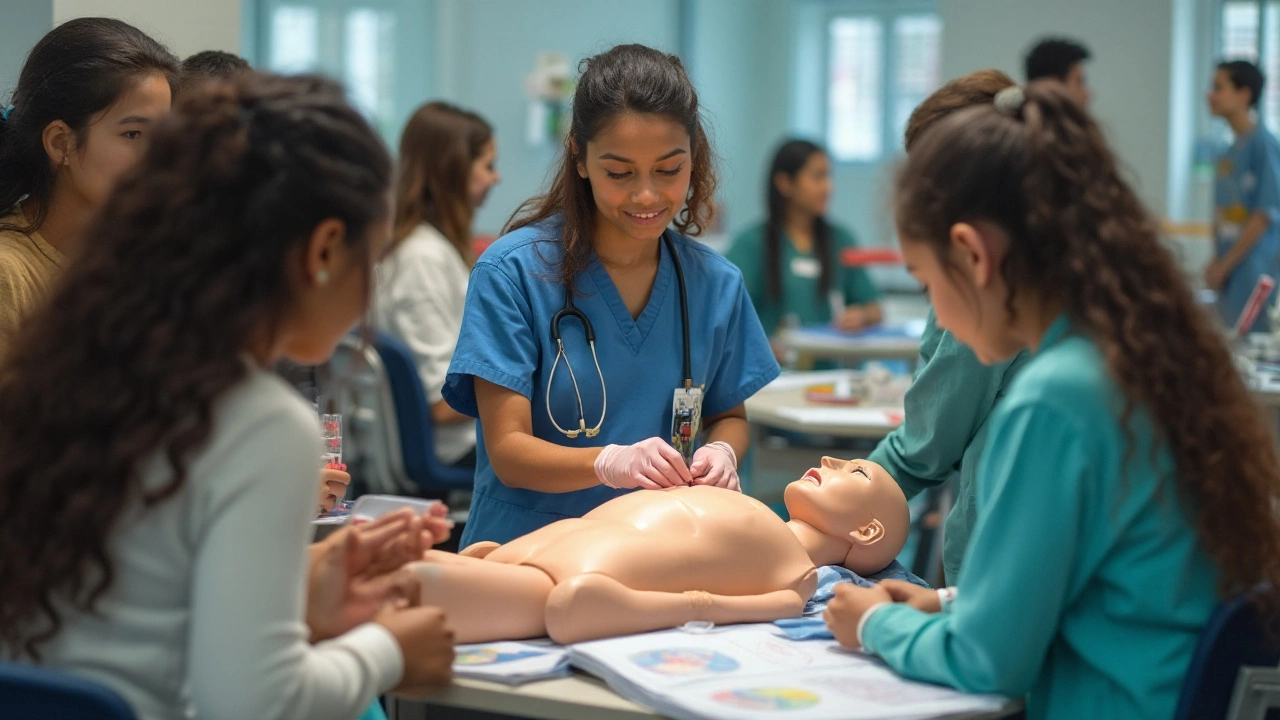Vocational training is a world where education meets practical skill development. Instead of focusing solely on academic theory, these courses are designed to equip individuals with hands-on experience needed in specific trades and professions.
Whether you're looking to plunge into healthcare, explore the realm of technology, or get hands-on with construction trades, vocational programs offer an array of options. They emphasize a tailored curriculum that aligns with the needs of ever-evolving industries.
This approach ensures that learners can step into the workforce with confidence, armed with the practical skills that employers are actively seeking. It's education with a direct path to career readiness, providing opportunities for a fruitful and fulfilling professional life.
- Understanding Vocational Training
- Types of Vocational Courses
- Benefits of Vocational Education
- Industries that Rely on Vocational Training
- How to Choose the Right Vocational Program
- Future Trends in Vocational Education
Understanding Vocational Training
Vocational training bridges the gap between theoretical education and professional skills required in the workforce. It plays a crucial role in preparing individuals for employment in various industries by providing them with specialized knowledge and practical expertise. Unlike traditional academic programs, vocational courses focus more on teaching specific trades and skills needed for careers in fields such as healthcare, technology, manufacturing, and the arts.
These programs are typically shorter in duration compared to traditional degree courses, making them a practical option for those eager to enter the workforce quickly. Enrolling in vocational training can be advantageous because it emphasizes skills that are directly applicable to the job market. Hands-on experience, often in the form of apprenticeships or internships, is a cornerstone of vocational education, offering students real-world insights and experience.
In many countries, vocational training might be referred to as Career and Technical Education (CTE). According to the National Center for Education Statistics, vocational enrollment was shown to increase job prospects and economic stability for graduates when compared to non-graduates in similar fields. This pragmatic approach not only equips learners with technical skills but often includes modules on soft skills, such as communication, teamwork, and problem-solving, which are crucial for success in any job.
"Vocational training is a key driver of economic growth because it provides individuals with the tools they need to thrive in a rapidly changing job market," says John L. Dougherty, a noted education analyst.
Global trends show a growing demand for skilled workers in sectors like energy, construction, and healthcare, indicating that vocational training is becoming increasingly valued in today’s economy. Modern vocational courses also incorporate technology and innovative teaching methods to keep pace with the dynamic demands of various industries. It is essential for learners to recognize the benefits of acquiring focused, industry-ready skills through vocational education. This approach not only caters to immediate job requirements but also sets the foundation for lifelong learning and career growth.
Some educational institutions offer hybrid options that blend online learning with hands-on training, expanding accessibility for students everywhere. As a result, vocational training can be pursued both on-campus and remotely, opening doors for a wider audience. By fostering partnerships with businesses, educational institutions ensure that their vocational courses remain relevant and aligned with industry needs. Skilled careers resulting from these efforts play a vital role in the modern economy, contributing to productivity and innovation.
Types of Vocational Courses
In today's dynamic job market, a wide spectrum of vocational training courses cater to diverse industries. These specialized programs focus on developing practical expertise to meet the demands of specific careers. For those inclined towards healthcare, there are certified nursing assistant (CNA) and medical coding courses that provide vital skills critical for hospital and healthcare settings. These programs are meticulously designed to cover aspects like patient care, medical billing, and administrative tasks, equipping learners with the ability to perform these roles efficiently.
In the realm of technology, vocational courses offer a hands-on approach to mastering skills such as programming, networking, and cybersecurity. For instance, coding bootcamps offer intensive training in languages like Python and JavaScript, enabling students to build applications and contribute to the digital landscape. Network administration programs, on the other hand, ensure a profound understanding of managing and securing IT infrastructure, a skill that's increasingly in demand as businesses continue to pivot towards digital operations.
"Hands-on learning remains crucial; it transforms education by enabling students to apply theoretical knowledge in real-world settings," says John Smith, Education Expert at TechEd Institute.
Trades and crafts also boast a rich array of vocational opportunities. Carpentry, plumbing, and welding courses offer a comprehensive education grounded in practical experience. By engaging in real-world projects under the guidance of seasoned professionals, students not only learn the technical aspects of the trade but also acquire problem-solving and critical reasoning skills applicable in various job sites.
Moreover, the creative industries are not left behind. Fields such as graphic design and culinary arts offer structured vocational programs that nurture creativity while imparting industry-relevant techniques. Aspiring chefs gain hands-on culinary experience through rigorous training in different cuisines, while graphic design students learn to merge artistic software skills with marketing strategies, preparing them to cater to diverse client needs.
These targeted vocational courses stand as essential pathways for those who favor a practical learning approach. They ensure that graduates are not only theoretically competent but also job-ready, thriving in environments where hands-on expertise counts. The courses often include internships or apprenticeships, further enhancing the employability of participants. With the flexibility of night or weekend classes, vocational programs can be customized to accommodate those who are already juggling work or family commitments, making them an appealing option for many looking to enhance or shift their careers.
For those contemplating a career pivot or entering the job market for the first time, understanding the available types of vocational courses can be incredibly beneficial. By focusing on both emerging and established industries, these courses prepare students for roles that are both relevant and rewarding. Whether it's crafting a delectable dish or securing a network, vocational training provides a direct route to mastering skills that employers value highly.

Benefits of Vocational Education
When it comes to pursuing higher education, vocational training often stands out due to its many advantages. One of the key benefits is its focus on practical skills. Unlike traditional academic education that often emphasizes theory, vocational programs are designed to prepare students for real-world scenarios they are likely to encounter in their chosen fields. This pragmatic approach not only equips individuals with the necessary skills but also boosts their confidence as they step into the professional world.
An impressive factor about vocational training is its alignment with industry demands. Programs are developed in collaboration with experts and companies to ensure that the curriculum is up-to-date with the latest industry standards. This means that students learn exactly what employers are looking for. Such a relevant education increases employability, as graduates are often considered job-ready from day one. According to a study by Georgetown University’s Center on Education and the Workforce, individuals with an associate of vocational degree earn nearly $500,000 more over their careers than those with only a high school diploma.
Vocational education provides a unique opportunity for students to gain hands-on experience and foster relevant skills that are immediately applicable in the workforce. – National Center for Education Statistics
Another significant benefit is the diversity of fields available under vocational courses. From healthcare to automotive, and technology to culinary arts, vocational education offers pathways across a wide range of industries. This encourages students to explore and dive deep into areas they are genuinely passionate about. Additionally, these programs are usually shorter in duration compared to traditional degrees, allowing for a quicker transition into the labor market.
The cost-effectiveness of vocational education should not be underestimated. With rising tuition fees in universities, vocational courses offer a more affordable option without compromising on quality education. The reduced duration also means less financial burden in terms of tuition and living expenses. Moreover, the format of learning in vocational programs, which often includes internships and apprenticeships, allows students to earn while they learn, providing a financial cushion during their educational journey.
Flexibility is another appealing aspect of vocational education. Many programs offer part-time, evening, or online courses, helping students to balance their studies with personal or work commitments. This adaptability makes vocational training accessible to a broad demographic, including adults seeking a career change, young students, and those re-entering the workforce.
Overall, vocational education serves as a compelling alternative or supplement to traditional academic pathways. By focusing on real-world skill development, aligning with industry requirements, and offering financial and logistical advantages, vocational training empowers individuals to effectively pursue and thrive in their chosen careers.
Industries that Rely on Vocational Training
In today’s fast-paced world, industries are increasingly depending on vocational training to meet their employment needs. These programs are particularly vital in sectors where specific skills and hands-on experience are imperative. The healthcare industry is one such example. Here, vocational courses can produce qualified professionals like nursing assistants, lab technicians, and emergency medical technicians. These roles are essential for the operational success of hospitals and clinics, where quick, efficient patient care is crucial.
Another booming sector reliant on vocational education is technology. As the demand for software developers, network specialists, and IT support technicians grow, vocational programs step in to fill this gap. With a curriculum that emphasizes practical coding and problem-solving skills, graduates are often more prepared for entry-level positions than their theoretically-trained counterparts. It's a direct approach that prepares them to tackle real-world challenges with competence and confidence.
The trades, including plumbing, electrical, and construction fields, also lean heavily on graduates from vocational programs. In these professions, expertise is often gained through detailed, hands-on learning rather than abstract study. Vocational training ensures that workers can meet industry standards while adapting to new tools and techniques. This is crucial for maintaining safety and quality across construction projects.
The U.S. Bureau of Labor Statistics notes that "employment in the construction industry is expected to grow 4% over the next decade, adding about 296,300 new jobs." This reinforces the importance of vocational programs in sustaining the workforce pipeline.The culinary industry, too, finds value in vocational training, where aspiring chefs and bakers benefit immensely from practical kitchen experiences. These courses offer a blend of creative and technical education, preparing students for the high-pressure demands of bustling kitchens and fostering innovation in burgeoning food enterprises.
Transportation and Automotive
The transportation sector is yet another field where vocational training holds sway. Auto mechanics, diesel technicians, and aviation maintenance workers gain proficiency through training that prioritizes practical, hands-on learning. As technology advances, these programs are updated to include hybrid vehicles and evolving aviation standards, ensuring that graduates are always industry-ready. In manufacturing, vocational training is indispensable. Factories seek skilled labor for roles involving the operation of sophisticated machinery, quality control, and production systems. Training that includes specific machine handling and production line efficiency contributes greatly to productivity and quality output.Beyond these sectors, vocational training also finds a place in creative fields like media production, fashion design, and graphic artistry. Through targeted skill-building, students are emboldened to turn their creative visions into reality. The focus on collaboration and real-world application prepares them to navigate industries that are constantly shaped by cultural and technological shifts. As different industries evolve, the landscape of vocational education adapts, maintaining its relevance by closely aligning with sector-specific demands. It serves as a potent force in crafting a workforce that is both skilled and versatile, affirming its crucial role in the modern economy.

How to Choose the Right Vocational Program
Finding the right vocational program can be a transformative step in one's career journey. It's crucial to begin by identifying your interests and career goals, as vocational programs are incredibly diverse and cater to various fields such as healthcare, construction, technology, and more. Start by assessing what truly excites you and aligns with your professional aspirations. Understanding what you are passionate about can help you narrow down options and make informed decisions. Sometimes, speaking to career counselors or professionals already in your field of interest can offer invaluable insights into selecting a program that matches your needs.
Research is a critical step in the selection process. Delve into the details of the programs available and look into the curriculum offered by different institutions. Consider the aspects of each program, such as length, cost, and scheduling flexibility, especially if you are working or have other commitments. It's also worth checking the accreditation of the institution, as this can significantly impact the recognition of your certification in the job market. Accredited programs guarantee a certain level of quality and are more likely to be recognized by employers, which can be critical in ensuring your qualifications lead to job opportunities.
The reputation of the institution is another factor to weigh in. Look for feedback from past and current students regarding their experiences. Testimonials and reviews can provide a clear picture of the learning environment, quality of instruction, and job placement rates. Having a solid diploma or certificate from a reputable institution can be a strong selling point when you enter the job market. An interesting aside from Forbes noted,
"Choosing a vocational program with strong industry connections can significantly enhance job prospects upon graduation."This highlights the importance of looking for programs that have robust ties with businesses and offer practical experiences such as internships or lab work.
Another critical aspect is considering the job market demand for the skillset you are aiming to learn. While passion is important, you also want to ensure that you are investing time and resources into learning a skill that is in demand. Checking employment trends, median salaries, and growth predictions in your chosen field can provide a realistic backdrop against which to evaluate your options. Government labor statistics and industry reports can be valuable resources for this kind of research.
When selecting a program, it's also wise to consider the kind of learning environment that suits you best. Some people thrive in a hands-on setting, while others prefer more traditional classroom learning. Ensure the teaching methods and technology used match your learning style for the best educational experience. For instance, if you're interested in technology, you might want to find a program that uses the latest tools and platforms in teaching, which could give you an edge in the workplace.
Cost and financial aid options are practical considerations that should not be overlooked. Compare tuition fees and what they cover, such as materials, textbooks, and other resources. Investigating scholarships, grants, and payment plans can make a significant difference in your decision-making process. Some institutions offer financial incentives for students entering skilled careers in high-demand areas, so it's worth exploring those possibilities to alleviate financial burdens.
Future Trends in Vocational Education
As we step into the unfolding future, vocational training is poised to undergo significant transformations driven by technological advancements and shifting market needs. One of the most notable changes is the rise of digital learning platforms. With the world becoming increasingly connected, more vocational courses are integrating online and hybrid models to reach broader audiences. This shift not only makes learning more accessible but also allows students to balance their education with other commitments. According to a report by the World Economic Forum, by 2025, nearly half of the workforce will require reskilling, which places vocational education at the forefront of filling this need.
Another interesting trend is the focus on green technologies and renewable energy. As industries pivot to sustainable practices, vocational programs are adapting to include eco-friendly technologies and methodologies. Students are learning to implement energy-efficient systems in construction or delve into the nuances of sustainable agriculture. This shift is not only about catching up with environmental demands but also preparing a workforce that can thrive in a world that values sustainability.
"Vocational education is set to play a pivotal role in preparing the workforce for the green economy. This is an exciting era for vocational learners." - Global Skills Insights
Moreover, an increasing emphasis on soft skills has emerged within vocational curriculums. While technical expertise is crucial, industries are also seeking individuals adept in communication, problem-solving, and teamwork. Courses are beginning to embed these skills into their core content, ensuring graduates are well-rounded and ready for the demands of modern workplaces.
There's also an intriguing expansion into niche and emerging fields such as robotics, artificial intelligence, and biotech. As automation and AI weave deeper into the fabric of industry, there is a growing demand for specialized training in these areas. Many vocational institutions are now partnering with tech companies to develop courses tailored to these futuristic domains, bridging traditional vocational training with cutting-edge technology.
Data from around the world indicates a growing acknowledgement of the value brought by vocational education. Many countries are increasing their investments in building and enhancing these programs. For instance, a study showed that countries with strong vocational training systems often have lower youth unemployment rates, highlighting the economic impact of this educational approach.
Finally, lifelong learning is gaining traction as a foundational component of vocational training. With rapid changes across industries, continuous upskilling and reskilling are more necessary than ever. Vocational courses are being designed not as a one-time educational experience but as part of an ongoing journey, constantly evolving to accommodate and reflect the changes in the professional environment.
